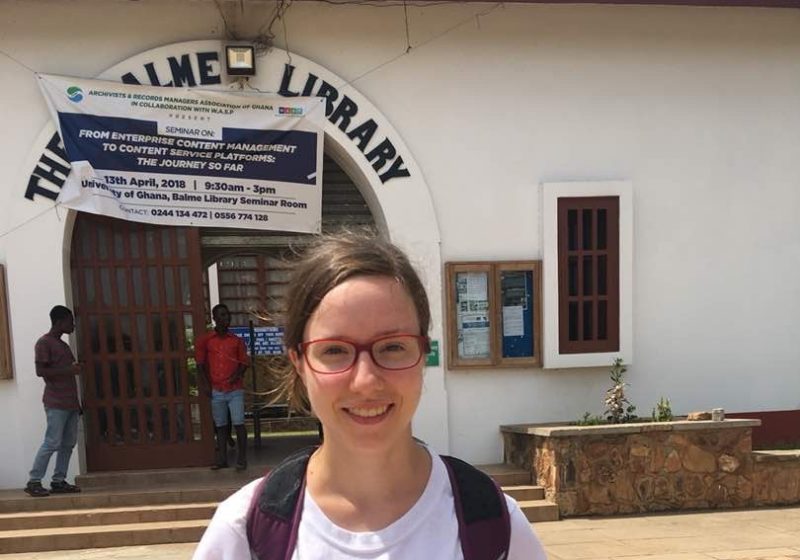Senior Julianne Kapner has always been fascinated by language. When she was 4 years old and a family member told her she had a big head, she responded, “it’s full of words.”
Though her physical proportions have evened out, Kapner’s bank of words continues to expand. During her first year, she was involved in the Linguistics Undergraduate Council and served as a workshop leader. As an enthusiastic member of the linguistics department at UR, she has been involved with several research projects in Professor Scott Grimm’s Quantitative Semantics Lab, as well as with Professor Maya Abtahian. Kapner has done research abroad in Ghana, on campus at UR, and out in the Rochester community.
“Someone once said the secret to life is showing up,” Kapner said.
In Professor Grimm’s lab, Kapner delves into how nouns behave in our language. Specifically, she studies nouns that could be perceived as non-specific — termed “weak definites.” For example, if John and Mary both took the bus home, did they take the same bus? Maybe not. Our interpretation of that noun allows for John and Mary to have taken separate buses home, therefore “the bus” is a weak definite.
Kapner queried a massive database of all the print publications in the US to find patterns in how these nouns work. She recently submitted an abstract to the Linguistics Society of America with the theory that these weak definites behave in more than one way — a more nuanced view of our previous understanding.
Though the intrinsic characteristics of the English language fascinate Kapner, she wanted to explore how different societies communicate through spoken language. However, there were bumps in the road.
Not all research projects are traditionally productive. In fact, the vast majority of experiments yield unusable data. This is the nature of exploring new frontiers with unestablished methods — things are bound to go wrong. Kapner experienced this disappointment when she traveled to Ghana last semester to study West African languages. She returned essentially empty-handed. However, the experience made her more resilient and capable as a researcher.
“It’s easy to say, harder to swallow,” Kapner said, “but no research is a waste of time.”
Undeterred upon her return to Rochester, Kapner dove into work she began last summer with Professor Abtahian. What is the Rochester accent? And why is it more pronounced in some Rochester natives than others? These are questions Kapner aims to address in her senior thesis through a Rochester community-engaged project.
In collaboration with the 19th Ward Community Association, Kapner performed roughly 10 90-minute oral history interviews with native Rochesterians. Recordings from these interviews will be made public at the end of this month by the Rochester Voices Project, and can be accessed through the Rochester Public Library. As one of several sister projects within the Rochester Accent Project, Kapner’s study will likely be the first to be completed.
These recordings will provide insight into our local accent and its interaction with socioeconomic and historical factors, and additionally serve the local community by providing first-hand accounts of Rochester history.
“Doing this kind of work really inspires me to do more with my research,” Kapner said.
One’s accent affects how others perceive them, both socially and professionally. Many of the individuals Kapner interviewed experience discrimination due to their pronounced Rochester accent, and some have even tried to suppress it in job interviews.
Kapner’s research combats this discrimination by bringing the community together, as well as by de-mystifying the Rochester accent. Defining and characterizing components of our local accent may change the prejudiced way in which some people view it.
Working outside of the University bubble changed Kapner’s perspective on linguistics research and its impact. She was captivated by the fascinating stories she heard from members of the 19th ward community.
“Being as quiet as you can and just listening to what they have to say is important,” Kapner said. “Working with speakers reminds me why linguistics research is powerful.”
Kapner’s work has spanned both the intrinsic nature of language and the ways in which people use it. The latter has been especially influential for her.
“A lot of research is researcher-centric rather than subject-centric,” Kapner said. Engaging the community in her research broadened the focus beyond data, and allowed her to connect with the people behind it. “We’re researching people, so let’s do research that benefits people.”
For Kapner, language is about the civilizations that created it, the people who speak it, and the scientists who study it. “Everybody has some kind of stake in it — everyone has a language.”

